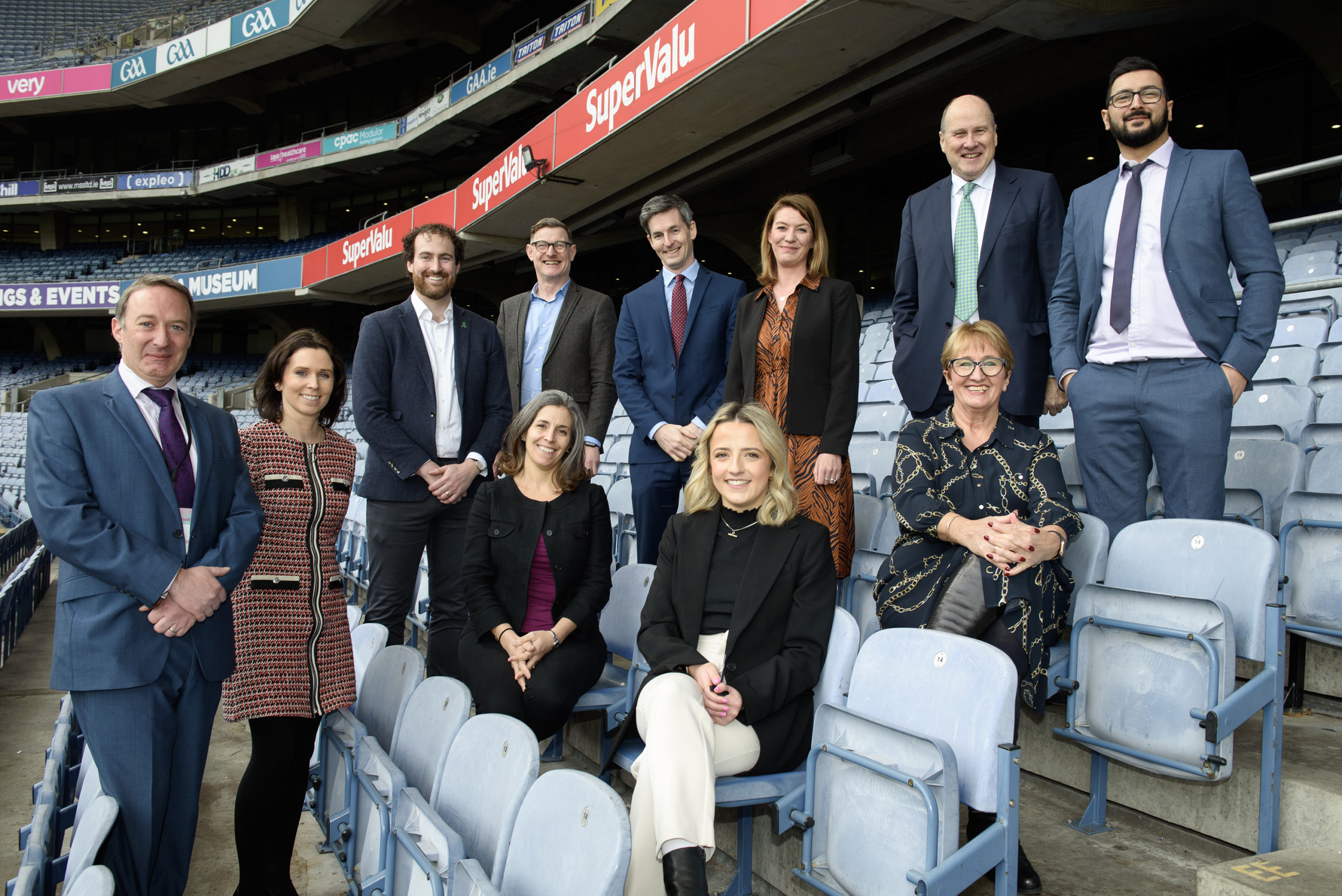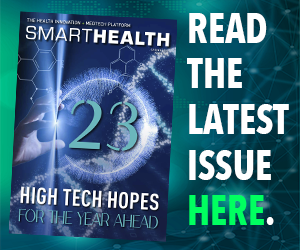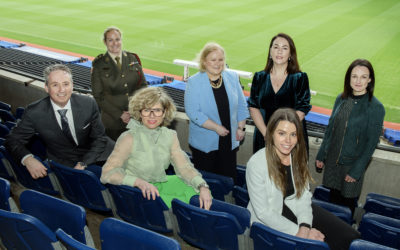Pictured above is Denis Weir, senior manager, Isaac Care; Caitriona Walsh, president and managing director, Novartis Ireland; Deb Mangone, country manager, Pfizer Healthcare Ireland; Liam Ryan, country manager, SilverCloud Ireland; Derek Richards, chief science officer, SilverCloud at Amwell; Dr Ronan Glynn, health sector lead, EY Ireland; Lauren Byrne, project manager, Isaac Care; Elaine Murray, communications lead, EIT Health; Creenagh Williamson, chief nursing and operating officer, HN; Ivan Yates, conference stream host and Mehdi Juma, head of communications and marketing, HN. Pictures by Maura Hickey
The 19th National Health Summit covered a variety of topics pivotal to the Irish healthcare system, including Sláintecare, writes Quinton O’Reilly
With Sláintecare finding its feet and winter illness outbreaks, the 19th National Health Summit came at a pivotal moment, bringing up important considerations for the Irish health system.
If there was a sign that the health sector is at a crossroads, it was best exemplified by how the three streams that happened late morning all dealt with essential topics.
With the theme ‘Taking stock and moving forward’, the 19th National Health Summit returned to an in-person event in Croke Park on Wednesday, February 8.
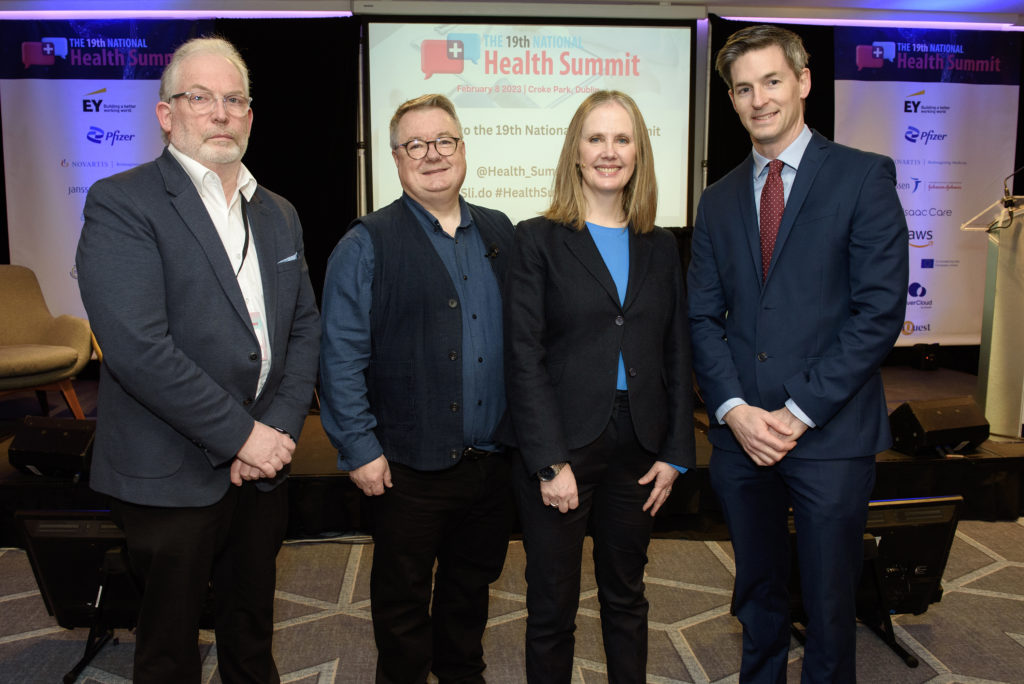
Tony O’Brien, leadership, governance and strategy consultant, Business Post columnist, chartered director, board chair, strategic adviser, former director general, HSE; Brian Dolan, OBE, director, Health Service 360, honorary professor of leadership in healthcare, School of Nursing, Midwifery & Social Work, University of Salford, Manchester; Audrey Carville, journalist and broadcaster, summit host and Dr Ronan Glynn, health sector lead, EY Ireland
Welcoming everyone to the summit, chair Audrey Carville, journalist, broadcaster and host of Radio 1’s Morning Ireland, said it would be “a lively and informative day with you at the heart of it”.
The session started off with a thoughtful keynote speech from Brian Dolan OBE, director at Health Service 360. His key message was on how patient time is the most essential currency in healthcare.
“It’s not money or buildings that connect health systems, it’s time,” he explained. “Access targets and waiting times are measured in time. Beds are not meaningful capacity; they’re just furniture people wait on for things to happen.
“Capacity is senior clinical decisionmakers who can move the patient on in their journey as, no matter how hard our junior staff work, they can’t move a patient.”
Ronan Glynn, health sector lead at EY Ireland, followed up and talked about building a healthier future for Ireland. Warning about the upcoming demographic changes and growing elderly population, he also highlighted a surprising fact about the sector’s emissions.
Not only does a typical hospital produce three times more emissions than a commercial building of similar size, just seven hours of anaesthesia has the same climate impact as a drive from Dublin to New Delhi and back.
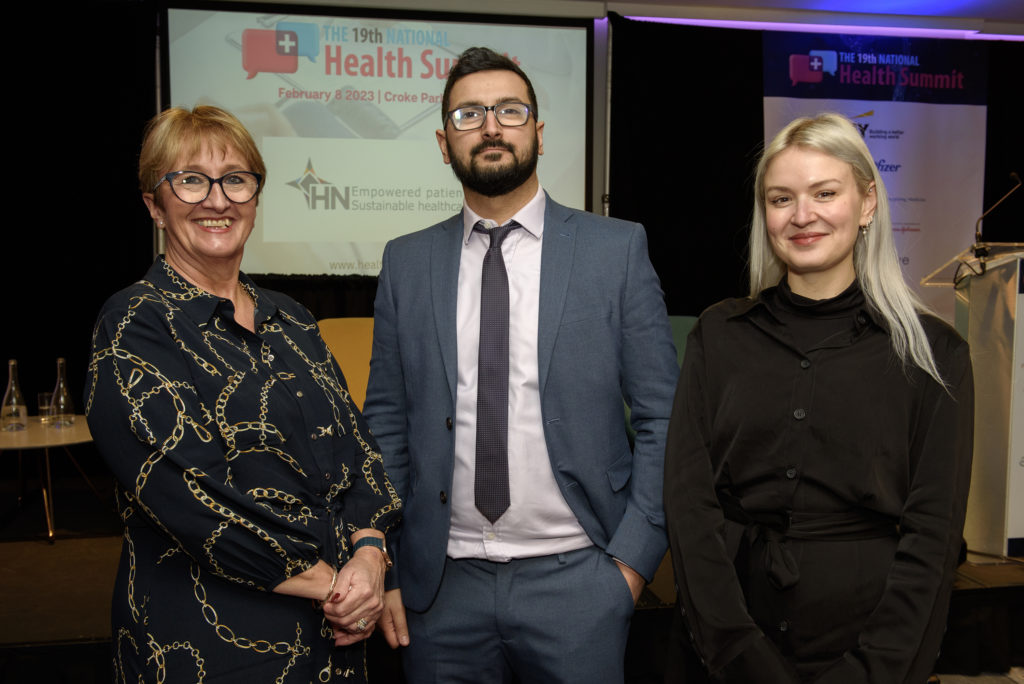
Creenagh Williamson, chief nursing and operating officer, HN; Mehdi Juma, head of communications and marketing, HN and Sara Reis, data scientist, HN
The day’s first panel discussion focused on one of the major themes, Policy and Leadership.
Discussing the benefits and drawbacks of Sláintecare were Robert Watt, secretary general for the Department of Health; Caitriona Walsh, president and managing director for Novartis Ireland; Sara Burke, director of the Centre for Health Policy and Management at the School of Medicine in Trinity College Dublin; and Robert Landers, president of the Irish Hospital Consultants Association.
It was a robust one, with metaphorical blows traded on how Sláintecare and the HSE are operating; the consensus being that while the will and support is there, Sláintecare is still a long way from achieving what it set out to do.
“Coming back after nine years away, a lot has changed but nothing has changed,” said Walsh. “The political will is there and that’s clear.
“With healthcare records, many countries have it already, but Ireland is still working on that. We could look at that as an opportunity as we don’t have a fragmented system of electronic health records that other countries have so we can look at it as an opportunity to do things right now.”
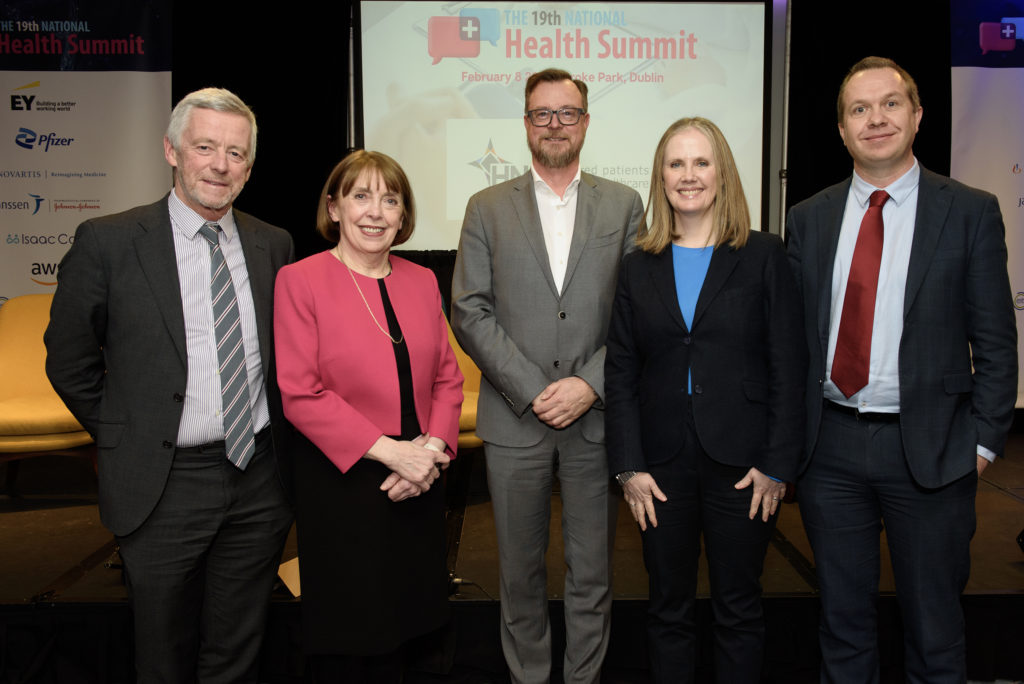
Dr Philip Crowley, acting national co-lead Public Health Response to Covid-19 and national director quality improvement, Office of the Chief Clinical Officer, HSE; Roisin Shortall, co-founder and co-leader and spokesperson on Health, the Social Democrats; Dr Thorsten Giesecke, general manager, commercial business, Janssen Sciences Ireland UC; Audrey Carville, journalist and broadcaster, summit host, and Derek O’Keeffe, consultant physician, Galway University Hospitals, engineer, professor of medical devices, University of Galway
Breaking down the industry
After the morning break, the discussion broke off into three streams. The first continued with Policy and Leadership chaired by Carville; Integrated Care, chaired by Dr Paul Carroll, GP at Centric Health; and Innovation on the Frontline, chaired by Ivan Yates, entrepreneur and broadcaster.
The Policy and Leadership stream continued with a panel discussion on where we are now on the Sláintecare roadmap and the key challenges faced.
Carville was joined by Dolan; Lucy Nugent, chief executive of Tallaght University Hospital; Audry Deane, consultant and Sláintecare Healthy Communities programme mentor; and Tony O’Brien, leadership, governance and strategy consultant and former director general of the HSE.
Deane was critical of comments made in the last panel session, stating how she was “quite outraged” by the secretary general’s suggestion that most people had a good experience of the health system. She highlighted how crucial it is to track data as fragmentation and siloed systems will bring change to a halt.
Following that was a case study on how user data and predictive analytics can help provide care proactively, delivered by Mark England, chief executive of HN; Sara Reis, data scientist at HN; and Matthew Cooke, adviser in digital health, emergency care and innovation.
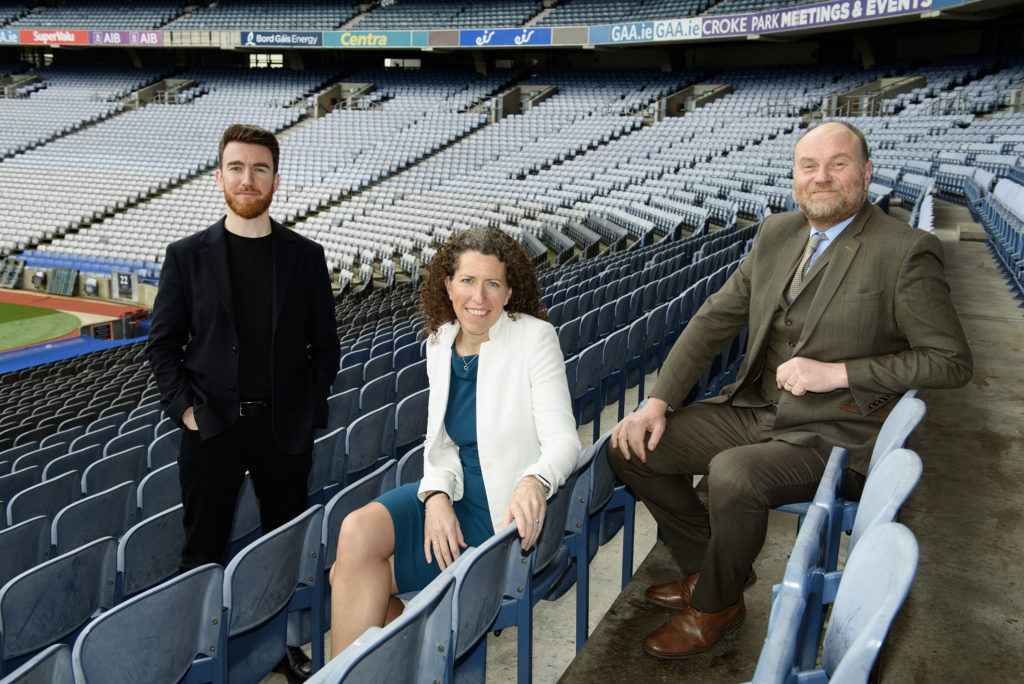
David Pollard, education lead, EIT Health Ireland-UK; Siobhain Duggan, director of innovation and healthcare, GS1 Ireland and Andy Bleaden, community director, ECH Alliance
Before the lunch break, there were two more panel sessions.
The first was on turning policy into action, much of which came down to setting up the necessary culture and structures needed to deliver on what is an emission-heavy industry.
It included Derek Cawley, consultant spine surgeon for Irish Doctors for the Environment; Susan Treacy, chief executive of HealthTech Ireland; and Ina Kelly, chair of public health medicine environment & health group for the HSE. The second focused on improving the culture around healthcare to improve retention within the HSE.
This featured Tony Kerins, principal automation advocate at OpenSky Data Systems; Leah O’Toole, assistant national director at the NDTP; Rachel McNamara, medical doctor and national fellow for innovation and change at the HSE; and Chris Luke, adjunct senior lecturer in public health at UCC.
When talking about where to begin, McNamara mentioned starting at the bottom, taking a human-centric approach to healthcare staff, and meeting their various needs as they progress through their careers.
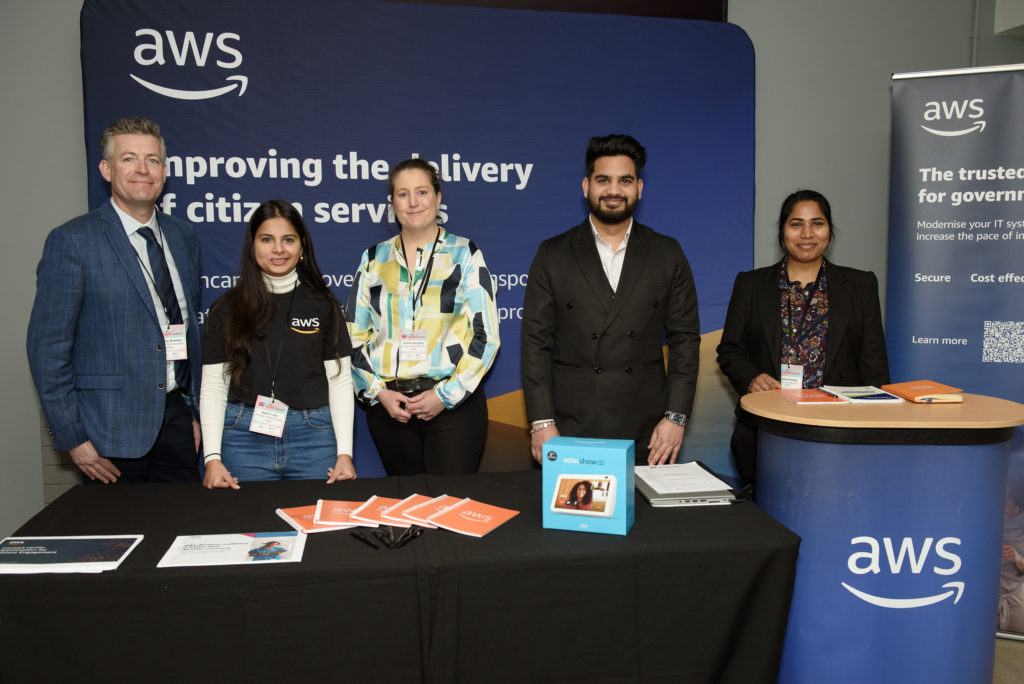
Thomas Sharkey, healthcare lead, Amazon Web Services (AWS); Saachi Jain, senior marketing response centre (MRC) representative, AWS; Sinéad Geraghty, marketing manager, AWS; Samir Kumar, solutions architect, AWS, and Ayesha Ahmed, healthcare account manager, AWS
Integrated care and frontline innovation
In the second stream on integrated care, Yvonne Goff, national director for Change & Innovation at the HSE, spoke about its change programme – one of the biggest reform programmes the organisation has undergone in decades.
Following that was Helen Buckingham, head of strategy at the Nuffield Trust in the UK, who discussed the lessons that Ireland can learn from the NHS, specifically the critical factors that ensure successful regional management – such as everyone knowing their role, as well as understanding where third-parties are coming from with their wants and needs.
Before lunch, two panel discussions took place. The first on the benefits of digital mental health innovations and how they could help address Ireland’s growing waiting times.
The session included Aoife O’Sullivan, ICGP/HSE integrated care GP clinical lead; Derek Chambers, GM policy implementation for mental health operations at the HSE and Derek Richards, chief science officer for SilverCloud at Amwell.
The second panel session focused on the changes needed to successfully integrate services at the frontline, which featured all parties working together and resisting a blame game while empowering patients.
That featured Susie Birney of ICPO; Ronan Fawsitt, GP and member of Sláintecare RHA Advisory Group; Martina Queally, chief officer of Community Healthcare East for the HSE; and Susan Kent, independent health consultant.
The final stream focusing on innovation began with Yates introducing the session and bringing on Caitriona Heffernan, innovation lead for the Spark Innovation Programme, to chat about how the HSE backs the programme by leveraging and supporting the passions of those innovating in the space.
Following her were presentations on two award-winning innovations. The first was on the Fluid Heart Tracker app, presented by Norma Caples, advanced nurse practitioner in heart failure in University Hospital Waterford. The second was the Rapid-Access Online Back Care (ABC) Programme which was created by Aoife Collins, physiotherapist for South Lee Primary Care in Cork.
The rest was dedicated to healthcare innovations like HaPPE Earth, a compostable medical waste solution co-founded by Mary O’Riordan, and ResWave, a wearable breathlessness therapy for those living with COPD which Miriam Savage, chief executive of Elevre Medical, co-founded.
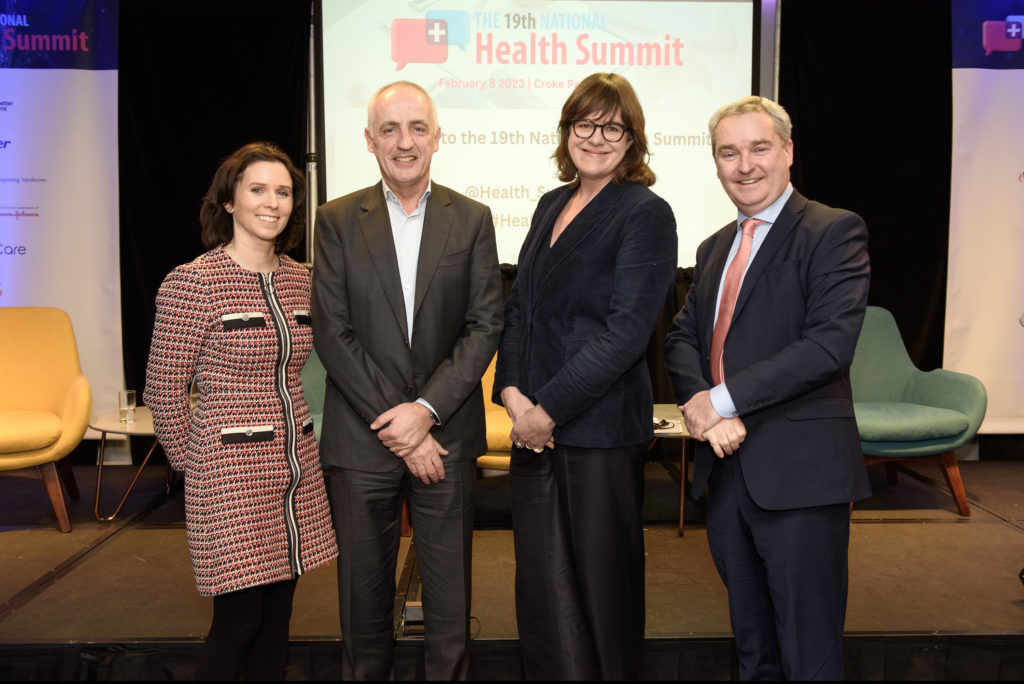
From left: Caitriona Walsh, president and managing director, Novartis Ireland; Professor Robert Landers, president, Irish Hospital Consultants Association; Dr Sara Burke, associate professor in health policy and management and director of the Centre for Health Policy and Management, School of Medicine, Trinity College Dublin, and Robert Watt, Secretary General, Department of Health
Following this was a talk on innovations to help take care of adults and children with complex needs, delivered by Dr Aviva Cohen,
chief executive and co-founder of seamlessCARE, and another on empowering patients to take ownership of their own health, brought by Richard Egan, chief executive and founder of Cushla Health Systems.
The stream concluded with feedback and discussion from a panel of experts, including Loretto Grogan, national clinical information officer for Nursing and Midwifery at the HSE; Siobhain Duggan, director of innovation and healthcare at GS1 Ireland; David Pollard, education lead at EIT Health Ireland-UK; and Andy Bleaden, community director at ECH Alliance.
Building future resilience and care The afternoon saw the three streams converge into one again with the afternoon talks chaired by Carville. The last batch kicked off with a conversation with Stephen Mulvany, interim chief executive of the HSE, who acknowledged the challenges and efforts needed to make Sláintecare a reality.
That said, there were green shoots starting to emerge, with many not noticeable to the average patient unless pointed out.
“I see a lot of reasons to be positive with public services,” he said. “A lot of the foundation pieces are going into place, the missing pieces are that culture and adopting an approach that seeks to drive out waste in all its forms.”
Following this was a presentation from Deb Mangone, country manager of Pfizer Healthcare Ireland, who discussed breakthroughs that changed patients’ lives. One treatment she touched upon is gene therapy which has exciting implications for rare diseases – but, quoting the rare diseases community, she said that it should be hope without the hype.
Next up was David Wall, chief information officer of Tallaght University Hospital, who spoke about the benefits of virtual ward models that can help improve care quality and access for patients, including the many technical innovations that can help with diagnosis, treatment and care.
The final panel discussion of the day was a broad overview on how the healthcare system looks in a world going through significant change and turmoil, featuring Thorsten Giesecke, general manager of commercial business for Janssen Sciences Ireland; Derek O’Keeffe, consultant physician for Galway University Hospitals; Roisin Shortall, TD co-founder and co-leader and spokesperson on health for the Social Democrats and Philip Crowley, national director quality improvement for the Office of the Chief Clinical Officer at the HSE.
Touching upon many of the themes and points of contention over the day, Giesecke mentioned how there’s a strong case for increased investment in healthcare.
“The investment in healthcare should continue and we need to build a more resilient system because this continuous firefighter mode is burning people out,” he said. “There is a white paper coming from the World Economic Forum which says that for every €1 that you invest in a resilient healthcare system, it can generate up to €4 in return.”
“If we look at healthcare not as a cost but as an investment, that would be a good argument for continued investment and building capacity.”

